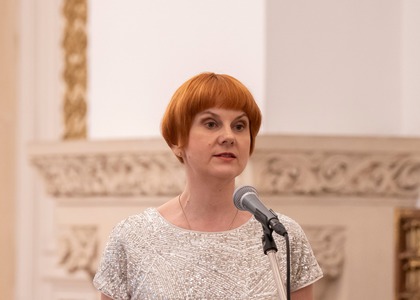> Interviews

Interview with Cristina Comandașu, new member of the European Radio Union Classical Music Group
Our colleague Cristina Comandașu, manager of Radio România Muzical, has become a member of the Classical Music Group of the European Broadcasting Union for the period 2024-2026. The group also includes representatives from public broadcasters in Ireland, Austria, Vatican, Germany, France, Great Britain, Denmark, Italy, Hungary.
First of all, congratulations! I'm sure that a large number of our listeners want to know exactly what the work of this group entails.
It is the classical music group of the EBU - European Broadcasting Union. It is a selection of members that is made every two years for this group, which is basically the strategy part for what classical music means at the European Broadcasting Union.
We have very strong connections with the European Broadcasting Union, as part, primarily, of this association of public broadcasters, and through the musical exchanges that are made. Romania is not represented there for the first time. Until two years ago, it was represented by our colleague Alina Velea, who now works in the International Relations Department, but who was part of the Radio România Muzical team until ten years ago.
So we have links that everyone can hear thanks to the direct broadcasts we make. Radio România Muzical is, in fact, the European radio station that broadcasts the most live concerts in the EBU offer. I myself have been the initiator of some very resonant projects, such as the "Ode to Peace", in March 2022, on the occasion of the outbreak of war in Ukraine... and now we see that Beethoven's Ninth Symphony has really become a symbol for Europeanness. But the first time this happened was on 10 March 2022, at the initiative of the editor-in-chief of Radio România Muzical, Cristina Comandașu, here.
What does this appointment mean for Radio România Muzical?
First of all, it's a question of representation. In fact, this group has monthly meetings, of which there are two face-to-face meetings: one is in September, the other is usually in May. Then, in May, there is also the meeting of all the music experts at EBU level and new projects are presented, successes are presented, people talk, experiences are exchanged. For me, it has always been a very important thing, because in fact Radio România Muzical has no equivalent in the Romanian market. Our brothers, so to speak, are similar broadcasters in Europe or in the United States of America and it is very important to keep in touch, to know what they are doing, what the meaning is and what we can do together.
From your experience, do these radio stations have the same level of success?
No. The level of success is not the same because the audiences are not really the same. But what is the same is the interest of the people working inside, the journalists, to provide a quality product that is audience-oriented in the sense of making classical music accessible. This is absolutely universal. There is a lot of discussion about the ways in which this would be done. Of course, in the last 20 years, the focus has been on online, on different platforms. Now there's talk about artificial intelligence, for example, there's a search for different ways of creating on-demand accessibility to content, which for young and perhaps not so young audiences is essential.
In fact, the challenges faced by all radio stations are also the challenges faced by classical music radio stations, but even more so in our case, as we work with a product that is very niche, which nevertheless addresses only a certain type of audience, because the structure of the Radio Romania Muzical audience - i.e. almost 90% with higher education and high incomes - is similar throughout Europe and, moreover, throughout the world, and it is natural that this should be the case. Everyone is looking for younger audiences, although there have been voices - not only from broadcasters, but also from streaming platforms... for example, I remember a presentation made by the CEO of IDAGIO, which is one of the very important classical music streaming platforms, who said that we have to look at the demographics in general. The audience is naturally ageing, the proportion of seniors is higher everywhere in developed societies compared to the younger one, but on the other hand, this is an audience that has the time and money to invest in it and also needs the quality entertainment that cult music offers.
We must, in fact, always look at things with open eyes and realize the reality of the world we live in and look for solutions, because I believe that classical music can be one of the solutions to the many problems that society has today.
In this sense, do you think that this group can offer solutions that will yield long-term results?
Here I don't know exactly. This is where ideas are exchanged and ideas can be proposed that can work for all radio stations. But from practical experience, from what we have seen so far, it is ultimately up to each individual radio station what they choose to do, their own editorial strategy. I mean, it's kind of like the European Union. There are some directives, there are some possibilities, but they have to be transposed into national legislation. It's pretty much the same thing. Here, it is even more lax because we are not talking about laws that are voted on in a European parliament, but just ideas that can come up. In fact, it's a very fine balance between what the international side means and what the national side means. But, however, let's not forget that classical music is that universal language where the international side counts a lot and this exchange of experience is also very important.
Translated by Vlad-Cristian Dinu,
University of Bucharest, Faculty of Foreign Languages and Literatures, MTTLC, year I
Corrected by Silvia Petrescu














